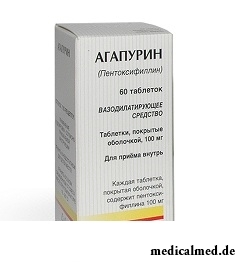





Agapurin
Application instruction:

Agapurin is the medicine which is improving microblood circulation, having angioprotektorny and vasodilating effect. Drug is capable to reduce aggregation of erythrocytes and thrombocytes, to stimulate a fibrinolysis and to lead to decrease in fibrinogen in blood.
Form of release and structure
Agapurin on group accessory treats vazodilatiruyushchy means. The international name – Pentoxifylline.
Drug is produced in the form of tablets and a concentrate for preparation of injection solution.
The biconvex tablets covered with a white cover with glossy gloss contain 100 mg of a pentoksifillin and excipients:
- Lactoses monohydrate;
- Starch corn;
- Silicon colloid anhydrous;
- Talc;
- Magnesium stearate.
The cover consists of sodium of a karmelloza, sucrose crystal, sucrose powdery, talc, methylparaben, titanium of dioxide, silicon colloid anhydrous, acacia gum.
Agapurin Retard represents tablets of the prolonged action, the film coated, containing 400 mg or 600 mg of a pentoksifillin and additional substances:
- To Gipromelloz 2200/15000;
- Povidone 40;
- Talc;
- Magnesium stearate.
The composition of transparent, colourless solution for infusions includes 100 mg on 1 ampoule of a pentoksifillin, and also sodium chloride and water for injections.
Indications to use
The following is specified in the instruction to Agapurin among states at which use of this drug is reasonable:
- Disturbance of peripheric circulation against the background of atherosclerotic, diabetic and inflammatory processes;
- Deterioration in blood circulation of a brain at post-apoplectic and ischemic states;
- Disturbances of a trophicity of fabrics owing to a varicosity, freezing injury, gangrene, trophic ulcers of a shin, a posttrombotichesky syndrome;
- Cerebral atherosclerosis;
- Raynaud's disease;
- Virus neuroinfection;
- Distsirkulyatorny encephalopathy;
- Disturbance of blood circulation in a choroid and a retina of an eye;
- Coronary heart disease;
- State after the postponed myocardial infarction;
- Otosclerosis;
- Impotence of vascular genesis;
- Bronchial asthma;
- Chronic obstructive pulmonary disease.
Contraindications
Agapurin's use is contraindicated at the following diseases and states:
- Tendency to bleedings, retinal apoplexies, massive bleedings;
- Porphyria;
- Heavy arrhythmias;
- Acute hemorrhagic stroke, myocardial infarction;
- Severe form of atherosclerosis of coronary or cerebral vessels.
The children's age, the period of pregnancy and lactation, individual sensitivity to a pentoksifillin and other derivatives of methylxanthine are also the contraindications specified in the instruction to Agapurin.
Route of administration and dosage
Agapurin it is necessary to accept at the same time days after food, washing down with a large amount of water. Not to chew.
The initial dose makes 200 mg 3 times a day. If long therapy is necessary or bad portability of drug is observed, then the single dose decreases to 100 mg at preservation of number of receptions. The daily dose should not exceed 1200 mg.
Route of administration of Agapurin in the form of tablets with the prolonged action same, as well as tablets, coated; perhaps only reduction of frequency rate of administration of drug.
Agapurin in the form of solution for injections can be entered the next ways:
- Intramusculary. About 100 mg 1-2 times a day are usually entered, contents of an ampoule are not dissolved;
- Intravenously. According to the instruction to Agapurin, contents of an ampoule should be parted in 250-500 ml 0,9% of solution of sodium of chloride or 5% of solution of glucose. The drug has to be administered slowly, no more than 150 ml an hour. At good tolerance the daily dose increases to 2 ampoules (200 mg);
- Vnutriarterialno. Therapy begins with introduction of the contents of one ampoule dissolved in 20-50 ml of isotonic sodium of chloride within 10 minutes. At long treatment increase in a dose of drug up to 2-3 ampoules divorced in 30-50 ml of solution is possible.
The optimum dose of Agapurin is defined by the doctor individually for each patient.
Side effects
Agapurin can cause negative effects from outside:
- Nervous system – a sleep disorder, uneasiness, spasms, dizziness, headaches;
- The alimentary system – an intestines atony, cholestatic hepatitis, an exacerbation of cholecystitis, a loss of appetite, dryness in a mouth;
- Blood vessels and integuments – hypostases, a dermahemia of the person, rushes of blood to the person and an upper part of a thorax, fragility of nails;
- Cardiovascular system – a cardialgia, arrhythmia, tachycardia, a lowering of arterial pressure, progressing of stenocardia;
- Sense bodys – scotoma, a vision disorder;
- Systems of a hemostasis and bodies of a hemopoiesis – a leukopenia, a hypofibrinogenemia, thrombocytopenia, a pancytopenia, gastromenias, intestines, mucous membranes, hypodermic capillaries;
- Allergic reactions – urticaria, an itch, an acute anaphylaxis, a Quincke's disease.
Symptoms of overdose by Agapurin:
- Nausea;
- Dizziness;
- Tachycardia;
- Lowering of arterial pressure;
- Fever;
- Excitement;
- Loss of consciousness;
- Areflexia;
- Tonic and clonic spasms.
Special instructions
Reduction of a dose can be required by elderly people.
Smoking reduces a therapeutic effectiveness of Agapurin.
Analogs
Pentoksifillin is a part of a number of drugs:
- Vazonit;
- Pentilenum;
- Pentoksifillin;
- Trental;
- Fleksital.
Agapurin's analogs on the mechanism of action are:
- Xantinoli nicotinas;
- Teonicolum.
Terms and storage conditions
To store in the dry dark place, at a temperature not above 25 °C. To protect from children.
The period of validity of drug depends on a form of release and amount of active ingredient – from 3 to 5 years.
Drug for cough Terpinkod is one of leaders of sales, not because of the medicinal properties at all.

Partial and the more so full loss of hearing significantly reduces quality of life. Difficulties with communication lead to loneliness and замкн...
Section: Articles about health
Cold – a state known to everyone which is followed by cold, cough, high temperature, a pharyngalgia. Often the first that we begin to do in hope again to become healthy – to accept medicines which are not always harmless, then...
Section: Articles about health
Iodine - one of thirty most important microelements in our organism. The main role of iodine consists in synthesis of thyroid hormones of a thyroid gland - the substances which are responsible for the majority of exchange processes of an organism. It is known that thyroid hormones consist of iodine more than for 65%. The lack of iodine leads to decrease in production of hormones and, as a result, development of a hypothyroidism. The long condition of deficit can become a source of problems of the cardiovascular, bone, digestive SI...
Section: Articles about health
Dark circles (bruises) under eyes – a shortcoming with most of which often fight against the help of cosmetics (proofreaders, salons...
Section: Articles about health
The stroke is one of the most widespread diseases of the person, annually in the world about 6 million cases of this pathology are registered. According to medical statistics, strokes occur almost three times more often than myocardial infarctions. Disease otno...
Section: Articles about health
Striya (extension) are the defects of skin having an appearance of direct or wavy strips from 1 to 10 cm long and 1-5 mm wide. In most cases at women of a striya are located on a stomach, hips, a breast or buttocks. At athletes they can appear on shoulders and the internal surface of forearms. At initial stages of development of an extension have red or lilac color, but over time their coloring turns pale, and strips become whitish, getting a nacreous shade....
Section: Articles about health
Doctors claim that the people not so familiar with a dorsodynia occur among adult Russians very seldom. At the same time подавляющ...
Section: Articles about health
The advantage of swimming for the person is so high that this sport is not only the most popular, but also is widely applied in medicine and rehabilitation processes. If you look for for yourself the occupation allowing pleasantly and to spend time, then swimming with advantage...
Section: Slideshow
The number of long-livers is very small. One person from 5 thousand lives up to age of 90 years, and the centenary boundary steps over only one of 20 thousand. However, doctors claim that each of us is quite able to affect own destiny. At the same time it is not so much about living as long as possible, how many about an opportunity to keep physical and intellectual activity and to avoid decrepitude. We will also talk about the ways helping to achieve this result today....
Section: Articles about health
Life of the modern child is extremely active and difficult. Information strain which is experienced by the school student and did not dream the pupil...
Section: Articles about health
The person, as well as all other beings living on our planet feels weather changing. It is the normal meteosensitivity which is not causing to healthy people of special troubles. Meteodependence, on the contrary, is morbid condition, характеризующимс...
Section: Articles about health
Bathing in broths of medical flowers and plants (phytobathtub) was eurysynusic since Cleopatra who is a good judge in all that concerns beauty and health. And today phytobathtubs is the simple and available means allowing not only to remove nervous tension, but also to recover from many diseases. Grass bathtubs at treatment of cold, osteochondrosis, radiculitis, skin diseases, and also diseases of urinary tract and vessels are especially effective....
Section: Articles about health
The immunity role in growth of the child is invaluable. The proteins-immunoglobulins produced by immune system preserve the child against diseases...
Section: Articles about health
Life does not indulge the modern woman special emotional comfort and carelessness. The fatigue, troubles at work, misunderstanding in a family and various illnesses immediately affect a condition of hair and skin. And to look safe and attractive so хоч...
Section: Articles about health
Almost each of us during life faced dissatisfaction with own body. At such moments, as a rule, we begin to shame ourselves, urgently we go on the most rigid diet promising minus of 10 kg in a week, or we exhaust ourselves in the gym to almost death. As a rule, similar attempts come to an end with a campaign to the refrigerator for jamming of the next stress. Further history repeats itself with individual frequency....
Section: Articles about health
It is pleasant to state a possibility of improvement of quality of life of people with problems of functioning of secretory system. By efforts that...
Section: Articles about health
The dietology, as well as other sciences, does not stand still. Food stuffs are exposed to comprehensive study, and scientists obtain new information on their properties and influence on a human body. Unfortunately, this reasonable and natural process from time to time д...
Section: Articles about health
The drugs stopping or oppressing life activity of pathogenic microorganisms are widely applied in clinical practice from 40th years of the last century. Originally antibiotics were called only substances natural (animal, vegetable or microbic) origins, but over time this concept extended, and it includes also semi-synthetic and completely artificial antibacterial drugs....
Section: Articles about health
Insufficiently strongly expressed sexual desire or lack of satisfaction from sexual contacts can test time from in...
Section: Articles about health
Statistically, in Russia about 34% of citizens smoke. Most of consumers of tobacco has problems with health sooner or later. Not only smokers, but also their relatives suffer. Besides, cigarettes are expensive, and need of their acquisition heavy bry...
Section: Articles about health
There comes the season of issues. Many Russians already dream of outdoor recreation, trips, beautiful seaside beaches. At this time there is no wish to think of problems with health and other unpleasant things, however there are subjects which require attention. In the summer repeatedly the risk increases to ache with some very dangerous illnesses, we also will talk about them today....
Section: Articles about health
Antibiotics - - it is possible to call the chemical compounds suppressing growth of bacteria the break in the field of medicine which allowed to save persons...
Section: Articles about health
Childbirth is the most important event in life of each woman. We are women we give birth to the new little man on this light. Now the tendency to that was outlined, as men want to participate in labor too. But there is a question and whether it is worth allowing the husband...
Section: Articles about health
Cystitis, or inflammation of a mucous membrane of a bladder, this very widespread disease which, owing to some features of a structure of bodies of urinogenital system, women have approximately four times more often than men. Women aged from 20 up to 45 years enter into the main risk group. Cystitis is an illness of a bacterial origin. It can have an acute or chronic current. The second option is dangerous not only a frequent recurrence, серьезн...
Section: Articles about health
Extracorporal fertilization – one of the most modern methods of controlling with infertility. So far it already helped znach...
Section: Articles about health
For the city dweller the fitness is the most convenient sport. It is enough to acquire the subscription to the gym to get access to various apparatuses and an opportunity to train under the leadership of the experienced consultant. Many consider fitness on...
Section: Articles about health
Bulimia and anorexia, are heavy deviations of a feeding behavior, become a cause of death of patients much more often than all other nervous breakdowns combined. In 60% of cases two illnesses accompany each other: patients feel horror before danger of set of excess weight and try to refuse as often as possible food, but periodically suffer from attacks of sudden hunger and an uncontrollable overeating. Each patient with anorexia and bulimia needs the help qualified пс...
Section: Articles about health
